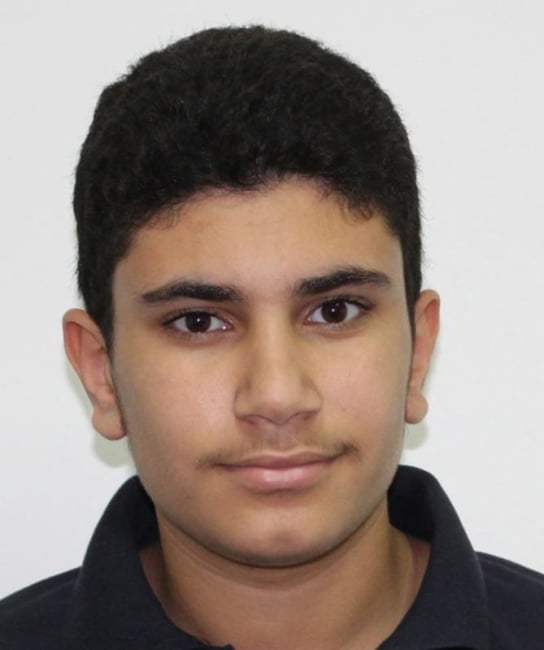You have /5 articles left.
Sign up for a free account or log in.

Ismail Ajjawi
Courtesy of AMIDEAST
A Palestinian student bound for Harvard University who was denied entry to the U.S. last month was able to enter the country on his second attempt Monday, shortly before the start of the university's academic year.
A spokesman for U.S. Customs and Border Protection confirmed the student, Ismail Ajjawi, "overcame all grounds of inadmissibility and was admitted into the United States as a student on a F1 visa."
The turnabout came 10 days after the agency denied entry to Ajjawi and put him on a plane back to Lebanon, having said they found him inadmissible to the U.S. based on information discovered during a CBP inspection.
Ajjawi told The Harvard Crimson, a student newspaper, that immigration officers questioned him about his religious beliefs and -- after searching his phone and laptop -- interrogated him about social media posts from Facebook friends that expressed political opposition to the U.S. Ajjawi said he had no posts on his own timeline that were of a political nature.
Ajjawi’s lawyer, Albert Mokhiber, declined to elaborate on the details of Ajjawi's interrogation. But he confirmed that Ajjawi initially arrived “with a valid passport and visa hoping to quickly clear customs and arrive at the campus. Unfortunately, that was not the case, he was detained, questioned and returned” to Lebanon.
“Fortunately, he did get a second interview at the embassy and was cleared to return, which he did just in time to catch the class photo and start classes this [Tuesday] morning,” Mokhiber said.
“He captured the hearts of many people, and it’s just a beautiful story about this young Palestinian refugee growing up in the camps, going to UNRWA [United Nations Relief and Works Agency for Palestine Refugees in the Near East] schools and getting a full scholarship to Harvard,” Mokhiber added. “It’s the stuff of movies. I think that’s why he had such support. He isn’t really a political individual. He’s just a young scholar. Inside and outside of government, I think here was a realization of that.”
Ajjawi is one of 54 students attending U.S. colleges this fall with the help of the Hope Fund, a program run by the nonprofit organization AMIDEAST, which helps high-achieving Palestinian students compete for scholarships to U.S. institutions. An undergraduate, he plans to study chemistry and physical biology.
“We are pleased that Ismail’s Harvard dream will come true after all,” AMIDEAST president and CEO Theodore Kattouf said in a statement. “Ismail is a bright young man whose hard work, intelligence and drive enabled him to overcome the challenges that Palestinian refugee youth continue to face in order to earn a scholarship.”
AMIDEAST thanked Harvard president Lawrence S. Bacow and other university officials for their efforts on Ajjawi’s behalf, and also thanked the U.S. Embassy in Beirut for reissuing him a visa in time for him to return to the U.S. to start classes with his peers.
The organization noted in its statement that Ajjawi had participated in the Competitive College Club -- a program for prospective U.S. college applicants offered by the State Department-funded Education USA advising center in Beirut -- "even though it required him to make a two-hour trip each way from his home in Tyre to Beirut to participate in the highly selective, rigorous program. Throughout, he continually demonstrated his keen wish to study in the United States through his hard work and perseverance."
A Harvard spokesman said Bacow was not commenting on Ajjawi’s specific case. But in a speech Bacow gave on Tuesday, he expressed concerns about U.S. visa and immigration policies affecting international students and scholars.
“Since May, the obstacles facing individuals ensnared in the nation’s visa and immigration process have only grown,” Bacow said. “Various international students and scholars eager to establish lives here on our campus find themselves the subject of scrutiny and suspicion in the name of national security, and they are reconsidering the value of joining our community in the face of disruptions and delays. I recently traveled to Washington to share my thoughts with members of Congress, and I also sent a letter to the secretary of state and the acting secretary of homeland security to express my concerns about the lasting effects the treatment of our friends and colleagues, here at Harvard and elsewhere, will have on the strength of our academic enterprise and on long-term American competitiveness. As our policy makers fulfill their necessary obligation to weigh issues of national security, I profoundly hope they will do so with full recognition of the ways that our country’s universities greatly benefit from the presence and participation of talented people from around the world, and the ways that U.S. national interests are served by a system of higher education whose strength rests on a willingness to transcend barriers, not erect them.”
In another case that has raised concerns, Arizona State University reported last week that nine returning undergraduate students from China were denied permission to re-enter the U.S. at Los Angeles International Airport.
"In each case, the students were in possession of all needed documentation to enter the U.S. yet they were refused entry at the airport, told they needed to return to China, that they needed to pay for their own airline ticket to do so or face a ban from re-entering the U.S. for five years," Arizona State president Michael M. Crow wrote in a letter to Secretary of State Mike Pompeo.
Crow requested "immediate review of the individual situations of each of our students but also an immediate review of the new 'standard procedures' which have apparently been put in place to review the electronic devices carried by our students when they enter the U.S."
Arizona State said Tuesday in a statement that the university has not received a response from federal officials to its inquiries, and that it has not received any information from CBP as to why its students were denied entry.
Experts said it is not clear if there has been an increase in the number of international students being denied entry at U.S. airports despite having valid visas and other travel documentation. The vast majority of international students who have visas to come to the U.S. enter without significant incident, but CBP has broad authority to deny entry to individuals it deems inadmissible even if they have a valid visa.
Lucy G. Cheung, an immigration lawyer and partner with the New York-based firm Goldstein and Cheung and chair of a NAFSA: Association of International Educators subcommittee focused on international student and scholar travel, said the reasons students are denied entry at the border vary.
Ajjawi's case raised widespread concerns among civil liberties advocates who were alarmed that he apparently was being punished for his friends' social media postings. But students also can be denied entry by CBP officials if they are suspected of working without authorization or of academic integrity violations, or if a petition from a family member suggests the student might intend to immigrate, contrary to the terms of his or her visa status as a visiting student or scholar. All of these situations are different, Cheung said, making it hard to generalize across cases.
"Students need to beware of what they have on their phones and understand that they shouldn't be coerced into saying something that is not true," Cheung said. Her advice for students is to "have your documents ready and know that the CBP has a lot of power to ask any kind of question. Be short and sweet, answer what is asked truthfully, but don’t divulge" information beyond that.
"There are students who are denied entry every year around this time, but rarely have we seen such publicity or such attention drawn. I’m happy that there was attention drawn to it," said Katie Tudini, the assistant vice provost and director for international student services at the State University of New York at Buffalo and the chair of NAFSA's International Student and Scholar Regulatory Practice Committee. "I do believe that the attention did ultimately help the Harvard student to get back so quickly."
Tudini said international student advisers are accustomed to preparing students for the process of applying for a student visa and doing the required visa interview. But she said international education professionals find it more difficult to advise students on what they might encounter at a port of entry now that practices -- if not in all cases actual policies -- have changed with the move toward more "extreme vetting" (a favored phrase of President Trump's).
"When it’s any agent’s decision to decide what is anti-U.S. rhetoric or political posts, that gets a little scarier for us, because it’s then very hard for us to advise students on what might be acceptable, what might not be acceptable, what might get them in trouble," Tudini said. "We will continue to give the advice we always give, which is be truthful and remember your documents. Where I really struggle is I worry that some of the advice that we could give students could really threaten their decision to come to the U.S. or come to our institutions. It's a really delicate balance of encouraging them that this is a welcoming place but also providing them with concrete guidance about how to navigate what might be a difficult conversation at the port of entry, or a hostile conversation, or just one they’re not used to."




